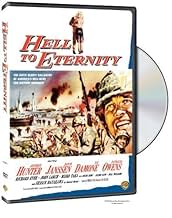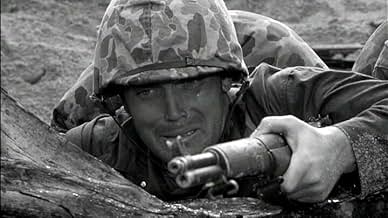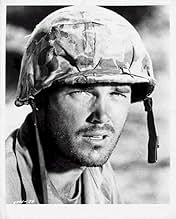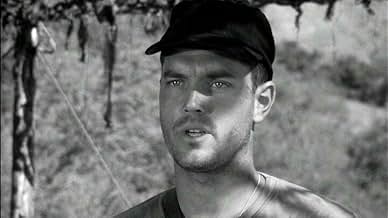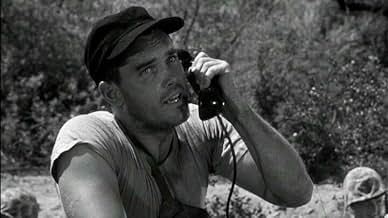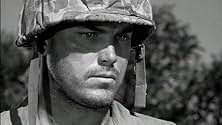CALIFICACIÓN DE IMDb
6.9/10
1.7 k
TU CALIFICACIÓN
Agrega una trama en tu idiomaWhen his adoptive Japanese-American family is sent to Manzanar after Pearl Harbor, a young Chicano enlists in the marines to become a hero in the Battle of Saipan.When his adoptive Japanese-American family is sent to Manzanar after Pearl Harbor, a young Chicano enlists in the marines to become a hero in the Battle of Saipan.When his adoptive Japanese-American family is sent to Manzanar after Pearl Harbor, a young Chicano enlists in the marines to become a hero in the Battle of Saipan.
- Dirección
- Guionistas
- Elenco
- Premios
- 3 nominaciones en total
George Takei
- George Une
- (as George Takai)
Tsuru Aoki
- Mother Une
- (as Tsuru Aoki Hayakawa)
- Dirección
- Guionistas
- Todo el elenco y el equipo
- Producción, taquilla y más en IMDbPro
Opiniones destacadas
Gabaldon was born and raised in Boyle Heights and attended Roosevelt High School with my brother-in-law Edwardo. He was not rejected by the Marines because of his ethnicity (Mexican-American) but because at 5'4" tall he did not meet Marine standards. It should be noted that the Marines were not adverse to recruiting in predominately Chicano communities. Guy was not "raised" by a Japanese family, but he did spend a couple of his teen year's with a Japanese family where he learned some basic Japanese. He was far from fluent in Japanese. However, the Marine Corps recruited him because they believed his knowledge of Japanese would be useful. The movie went to great lengths to hide Guy's true ethnicity. First, he was portrayed by Jeffrey Hunter, whose most notable role was playing 6'tall, blond blue eyed Jesus Christ. Guy described himself as "swarthy." In addition, there is a scene where the mamasan, in order to distinguish him from her Japanese grandchildren, refers to Guy as her "All American son." I once saw the movie on the History Channel. After the movie there was a panel discussion by historians. The final obligatory question was why the movie never mentioned that Guy was Mexican-American. The historian briefly answered that the movie was focused on the treatment of Japanese Americans during WW II and that Guy's ethnicity would have distracted from that. REALLY! Seems to me it would have made the story even more interesting. Typical Hollywood. Part of selling a movie means you have to make a white guy the central character and hero. More Hollywood is the David Jansen part and the party in Hawaii.
This is a war bio-pic about Guy Gabaldon of the USMC . It's a strange film featuring two distinct halves . One of Gabaldon newly arrived in the Marine Corps and the second half concentrating on the battle of Saipan . When I say strange what I mean is that it's heavily clichéd but for someone reason it manages to hide the clichés very well
The first half features those loud American who constantly feature in these type of movies . They're drinkers , gamblers , womanisers and heaven help anyone who has no concept of the alpha male . What makes this part of the film interesting is that there's a nightclub scene that has rampant sexuality featuring a female character and Gabaldon played by Jeffrey Hunter which must have seemed somewhat explicit at the time
The second half features the bloody battle of Saipan and one interesting thing about the landings is that Japanese characters speak to Japanese characters in Japanese without the benefit of subtitles . Compare this to films at the time had Germans speaking to one another in English and characters speaking in their native tongue must have appeared unusual back in the day . The battle scenes are relatively graphic though little children turning reminded me of THE GREEN BERETS
The problem with this movie is that for something that is marketed as a war film it takes a long time to reach its destination of the battlefield and with the exception of the nightclub scene the film is very talkative with little in the way of incident which stops it from becoming a great film . As it stands it's okay though it helps if you watch it of the era of when it was made
The first half features those loud American who constantly feature in these type of movies . They're drinkers , gamblers , womanisers and heaven help anyone who has no concept of the alpha male . What makes this part of the film interesting is that there's a nightclub scene that has rampant sexuality featuring a female character and Gabaldon played by Jeffrey Hunter which must have seemed somewhat explicit at the time
The second half features the bloody battle of Saipan and one interesting thing about the landings is that Japanese characters speak to Japanese characters in Japanese without the benefit of subtitles . Compare this to films at the time had Germans speaking to one another in English and characters speaking in their native tongue must have appeared unusual back in the day . The battle scenes are relatively graphic though little children turning reminded me of THE GREEN BERETS
The problem with this movie is that for something that is marketed as a war film it takes a long time to reach its destination of the battlefield and with the exception of the nightclub scene the film is very talkative with little in the way of incident which stops it from becoming a great film . As it stands it's okay though it helps if you watch it of the era of when it was made
I remember seeing this movie many times in the 60's and 70's at the theater, on television, and on VHS. I grew up watching WWII movies and remember this as one that had a special appeal to me. I guess because I lived in Japan in the 1950's and visited some of the locales from the movie. The acting was well done and the story was well told and realistic. It is interesting to view the cast when they were relatively new to movies. David Janssen and Vic Damone stand out in my memory and Jeffrey Hunter was always a class act in films. I highly recommend seeing it if possible. I do find it hard to believe that it is called a "lost classic" and runs so high for a copy. Anyone know where I could get a cheaper copy, I would like to hear from you.
I have been trying to buy this movie but the prices are out of reach. I was on Okinawa in 1960 when this movie was filmed. Our battalion was the first to occupy the brand new barracks at Camp Schwabb. A lot of us marines were chosen to be in the Japanese army because of our looks or physical stature. yes I played the part of a Japanese soldier and during the bonsai attack I was killed. I must say I died very dramatically. I had the pleasure of meeting Jeffery Hunter, David Janssen, and Vic Damone. I think the movie was pretty good even though some important parts were omitted. I have read several articles on the life of Guy Gabaldon and he looked nothing like Jeffery Hunter. Have a nice day.
HELL TO ETERNITY (1960) is, I believe, the first Hollywood film to depict the experiences of Japanese-Americans in the early stages of World War II. We see a young white guy and his Japanese female companion get harassed by patrons at a drive-in eatery in L.A. on December 7th as news of the sneak attack on Pearl Harbor comes over people's car radios. We see a Japanese-American family listen to the radio together as President Roosevelt addresses the nation and announces a state of war with Japan. We hear a young Japanese-American man describe his unsuccessful effort to enlist in the armed forces. We see Japanese-Americans being forced to leave their homes and possessions and get trucked off to relocation centers. We visit a cabin at the Manzanar internment camp in California. This must have been powerful material in 1960 and, I daresay, remains so today.
The movie pulls the viewer in emotionally right from the start as we see a troubled white youth, Guy Gabaldon (who was Mexican-American in real life), get into fights at school and go home to a decrepit shack, only to find his mother gone, taken to a hospital where she will soon die. He is taken in by the family of his Japanese classmate and is reared by them, experiencing genuine familial love for the first time. He even learns Japanese and we see him practicing words. The youth is played by Richard Eyer (the young genie in THE SEVENTH VOYAGE OF SINBAD), a young actor who sure knew how to pull our heart strings. Nine years later in the narrative, in 1941, Guy is played by Jeffrey Hunter and his Japanese brother, George, is played by George Takei. There are scenes between Guy and his Japanese mother that are quite touching, a profound and dramatic illustration of a mother-son bond that transcends language, cultural and racial barriers. (The mother is played by Tsuru Aoki Hayakawa, wife of Sessue Hayakawa, who appears in the film as General Matsui, the Japanese commander on the island of Saipan.) It's the exchange with his mother at Manzanar that convinces Guy to try and enlist in the Marines. (Hunter's portrayal of an orphan raised by a family of different race recalls his role as Martin Pawley, a part-Indian raised by the Edwards family in Texas in John Ford's THE SEARCHERS, 1956.)
After such advanced racial politics, there's a bizarre scene about midway through the film showing Guy and two of his marine buddies (David Janssen and Vic Damone) on liberty in Hawaii, where they wind up at the apartment of Sono, a Japanese bar hostess (Michi Kobi) and Famika, her Japanese roommate, a stripper from San Francisco (Reiko Sato). The third woman with them is an uptight white lady reporter, Sheila (Patricia Owens, from THE FLY), who's jealous of the attention paid by the men to the Japanese women and sits there sullenly knocking back one drink after another. Famika does her striptease act in the living room with appropriate music playing on the phonograph and gets the marines very excited indeed. While this action veered dangerously close to yet another case of Asian women being treated as exotic sex objects, the sexual and racial politics take a turn into much trickier territory. When she's finally drunk enough, Sheila, the proper lady reporter nicknamed "the Iron Petticoat," feels sufficiently emboldened to get up and do a striptease herself, much to the amusement of everyone there. Her act is even more revealing than that of the Japanese stripper. Eventually everyone's paired up and, as Guy starts grappling with Sheila's bra strap, there's a quick cut and---BOOM!--the big guns go off in the naval bombardment of Saipan, where the rest of the movie takes place.
The scene with the women is a long one and has no bearing on the rest of the narrative. (The women are never seen or referred to again.) I'm not quite sure what the point of it all was, but it's a fascinating footnote in the history of World War II combat movies and certainly pushed the envelope pretty far for 1960. Also, David Janssen's character is crazy drunk in this scene and the actor goes completely wild portraying this state. It's a remarkable display and I guarantee you've never seen him like this in anything he did for TV.
After intense and bloody combat on Saipan (filmed on Okinawa), the final stage of the film involves Guy's attempts to get the Japanese holdouts to surrender. Eventually, he confronts the English-speaking General Matsui (Hayakawa), who is planning one last suicidal "banzai" attack by the wounded, weary, and starving remnants of his force and the many Japanese civilians still with them. We hear about the Japanese code of war--no surrender and fight to the last man. And we'd earlier seen Japanese civilians throw themselves off a cliff to avoid capture, having been brainwashed by Japanese propaganda into believing they'd be raped and murdered by the Americans. This represents a much more honest look at Japan's conduct of the war than we were used to seeing in postwar Hollywood films about the war in the Pacific. Contrast this with Japan's own entry in the genre that year, I BOMBED PEARL HARBOR (1960), which I've also reviewed on IMDb. While HELL TO ETERNITY is about 25 minutes too long, it's still a powerful treatment of its subject, despite the unfortunate Hollywood compromise of hiding Gabaldon's true racial background.
Jeffrey Hunter and David Janssen would re-team the following year in MAN-TRAP (1961), which opens with a scene of Korean War combat featuring the two and also shows Janssen as a very different kind of character than we normally saw him play. I've also reviewed that one here. Hunter would go on to star in "Star Trek"'s pilot episode, while George Takei would gain fame playing Sulu, a regular character on that show. (As a boy, Takei spent the war years in internment camps.)
The movie pulls the viewer in emotionally right from the start as we see a troubled white youth, Guy Gabaldon (who was Mexican-American in real life), get into fights at school and go home to a decrepit shack, only to find his mother gone, taken to a hospital where she will soon die. He is taken in by the family of his Japanese classmate and is reared by them, experiencing genuine familial love for the first time. He even learns Japanese and we see him practicing words. The youth is played by Richard Eyer (the young genie in THE SEVENTH VOYAGE OF SINBAD), a young actor who sure knew how to pull our heart strings. Nine years later in the narrative, in 1941, Guy is played by Jeffrey Hunter and his Japanese brother, George, is played by George Takei. There are scenes between Guy and his Japanese mother that are quite touching, a profound and dramatic illustration of a mother-son bond that transcends language, cultural and racial barriers. (The mother is played by Tsuru Aoki Hayakawa, wife of Sessue Hayakawa, who appears in the film as General Matsui, the Japanese commander on the island of Saipan.) It's the exchange with his mother at Manzanar that convinces Guy to try and enlist in the Marines. (Hunter's portrayal of an orphan raised by a family of different race recalls his role as Martin Pawley, a part-Indian raised by the Edwards family in Texas in John Ford's THE SEARCHERS, 1956.)
After such advanced racial politics, there's a bizarre scene about midway through the film showing Guy and two of his marine buddies (David Janssen and Vic Damone) on liberty in Hawaii, where they wind up at the apartment of Sono, a Japanese bar hostess (Michi Kobi) and Famika, her Japanese roommate, a stripper from San Francisco (Reiko Sato). The third woman with them is an uptight white lady reporter, Sheila (Patricia Owens, from THE FLY), who's jealous of the attention paid by the men to the Japanese women and sits there sullenly knocking back one drink after another. Famika does her striptease act in the living room with appropriate music playing on the phonograph and gets the marines very excited indeed. While this action veered dangerously close to yet another case of Asian women being treated as exotic sex objects, the sexual and racial politics take a turn into much trickier territory. When she's finally drunk enough, Sheila, the proper lady reporter nicknamed "the Iron Petticoat," feels sufficiently emboldened to get up and do a striptease herself, much to the amusement of everyone there. Her act is even more revealing than that of the Japanese stripper. Eventually everyone's paired up and, as Guy starts grappling with Sheila's bra strap, there's a quick cut and---BOOM!--the big guns go off in the naval bombardment of Saipan, where the rest of the movie takes place.
The scene with the women is a long one and has no bearing on the rest of the narrative. (The women are never seen or referred to again.) I'm not quite sure what the point of it all was, but it's a fascinating footnote in the history of World War II combat movies and certainly pushed the envelope pretty far for 1960. Also, David Janssen's character is crazy drunk in this scene and the actor goes completely wild portraying this state. It's a remarkable display and I guarantee you've never seen him like this in anything he did for TV.
After intense and bloody combat on Saipan (filmed on Okinawa), the final stage of the film involves Guy's attempts to get the Japanese holdouts to surrender. Eventually, he confronts the English-speaking General Matsui (Hayakawa), who is planning one last suicidal "banzai" attack by the wounded, weary, and starving remnants of his force and the many Japanese civilians still with them. We hear about the Japanese code of war--no surrender and fight to the last man. And we'd earlier seen Japanese civilians throw themselves off a cliff to avoid capture, having been brainwashed by Japanese propaganda into believing they'd be raped and murdered by the Americans. This represents a much more honest look at Japan's conduct of the war than we were used to seeing in postwar Hollywood films about the war in the Pacific. Contrast this with Japan's own entry in the genre that year, I BOMBED PEARL HARBOR (1960), which I've also reviewed on IMDb. While HELL TO ETERNITY is about 25 minutes too long, it's still a powerful treatment of its subject, despite the unfortunate Hollywood compromise of hiding Gabaldon's true racial background.
Jeffrey Hunter and David Janssen would re-team the following year in MAN-TRAP (1961), which opens with a scene of Korean War combat featuring the two and also shows Janssen as a very different kind of character than we normally saw him play. I've also reviewed that one here. Hunter would go on to star in "Star Trek"'s pilot episode, while George Takei would gain fame playing Sulu, a regular character on that show. (As a boy, Takei spent the war years in internment camps.)
¿Sabías que…?
- TriviaOn July 8, 1944, Pfc. Guy Gabaldon single-handedly brought in 800 Japanese prisoners. He is credited with a total of 1,500 from June to August, 1944 from Saipan and Tinian islands.
- ErroresIn all of Vic Damone's scenes as Cpl. Pete Lewis, he is seen wearing a very shiny gold bracelet, including in combat scenes. In reality, no person in combat would have been allowed to wear a shiny gold bracelet, nor would they have wanted to, out of concern for the bright glint given off which might betray their position. Damone should have been told to remove the bracelet during filming.
- Citas
Capt. Schwabe: Lewis? How's it going? Says here you were shot in the ashcan.
Pete: Not bad, sir. Could have been a howitzer.
Selecciones populares
Inicia sesión para calificar y agrega a la lista de videos para obtener recomendaciones personalizadas
- How long is Hell to Eternity?Con tecnología de Alexa
Detalles
Taquilla
- Presupuesto
- USD 800,000 (estimado)
- Tiempo de ejecución
- 2h 11min(131 min)
- Color
- Relación de aspecto
- 1.85 : 1
Contribuir a esta página
Sugiere una edición o agrega el contenido que falta


